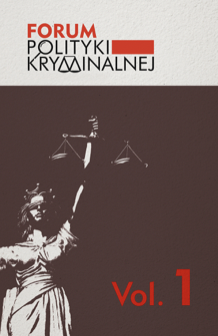Forum Polityki Kryminalnej
Forum on Criminal Policy
Publishing House: Wydawnictwo Uniwersytetu Śląskiego
Subject(s): Politics / Political Sciences, Law, Constitution, Jurisprudence
Frequency: 2 issues
Print ISSN: 2720-1589
Status: Active
- 2021
- 2022
- 2023
- Issue No. 1
- Issue No. 2
- Issue No. 3/1
- Issue No. 4/2
- Issue No. 6/2
Articles list
{{ article.TitleOriginalLanguage }}
{{ article.TitleOriginalLanguage }}
({{ article.TitleEnglish }})
- Publication: {{ article.Publisher }} ({{ article.Issue }})
- Author(s): {{ article.Authors }}
- Contributor(s): {{ article.Contributors }}
- Language: {{ article.Language }}
- Subject(s): {{ article.Subjects }}
- Issue: {{ article.Issue }}
- Page Range: {{ article.PageRange }}
- No. of Pages: {{ article.NumberOfPages }}
- Keywords: {{ article.Keywords }}
- Summary/Abstract: {{ article.SummaryAbstract }}
- Price: {{ common.currency(article.Price) }}
Short Description
The idea of establishing the "Forum Polityki Kryminalnej" (Forum on Criminal Policy) was born in the circle of criminal code theorists of the Faculty of Law and Administration of the University of Silesia in Katowice. However, its thematic scope go far beyond the Polish science of substantive criminal law. The subject of the journal includes primarily the title criminal policy (auxiliary science of criminal law, which aims to analyze the activities of the state, local communities and society, aimed at preventing and combating crime). According to this approach, published scientific works concern the policy of: creating criminal law, prosecuting offenses, applying punishments for offenses (criminal policy) and executing punishments, especially imprisonment (penitentiary policy). In addition to the narrowly understood criminal policy, in the magazine there is also a place for texts representing those fields of science that shape or should shape the response of the state and society to crime. The group of potential authors and recipients of the magazine is therefore not limited to criminal code theorists, criminologists, victimologists, penitentiarists and philosophers of law, but also includes, among others sociologists, psychologists, educators, resocialization specialists, and political scientists. One can be convinced that the issues will also interest employees of the broadly understood justice and law enforcement authorities, and - most importantly - legislators and members of legislative bodies.
Such extensive topics also create an ideal space for the internationalization of Polish science. We invite authors and reviewers from outside Poland to cooperate with us.

